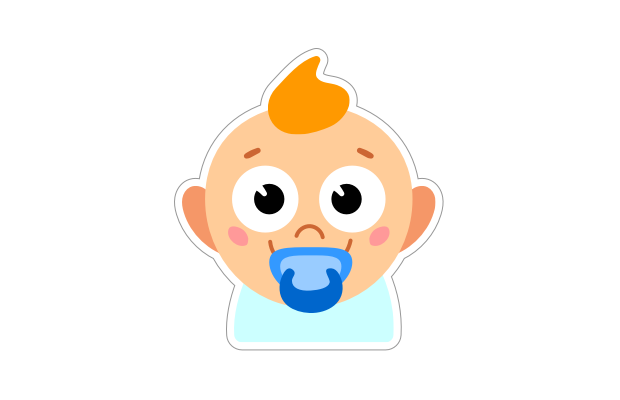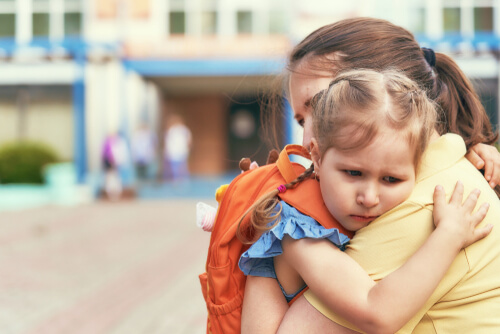Separation Anxiety - What To Do?!
Jan 15, 2022 Parents have asked: Separation Anxiety - I heard parents have it too? When do babies develop separation anxiety? How can moms handle it when they send the kid to preschool?
Ahh, yes . . . separation anxiety. Although it’s normal and something every child (and parent) goes through, it doesn’t make it any easier to deal with.
According to Nanit.com, ‘Separation anxiety’ refers to a developmental milestone that occurs in most babies between 6 to 7 months of age, when they gain a sense of object permanence. This is why your child might start hysterically crying when you put them to bed, leave for work in the morning, or drop them off at daycare.
I know what you’re thinking. What is object permanence? It’s a fancy term that basically means your baby knows that objects and people – like yourself – exist even if they’re not in the room or close by. Symptoms of separation anxiety happen as a direct result of this important new development.
As a parent, you’re like hey, at least they miss me, but then you start to wonder if you’ll ever be able to leave them for the next 18 years. Rest assured, it IS a phase and one they will outgrow!
The good thing? Once they feel safe and secure, they will calm down and the crying will subside. It may take a few tries, but it will get better.
If you are anticipating taking your child to preschool, there are a few tips/tricks that you can do to make sure separation anxiety doesn’t get the best of your child.

1. Practice separation
Leave your child with a caregiver for brief periods and short distances at first. As your child gets used to separation anxiety, you can gradually leave for longer and travel further.
2. Schedule separations after naps or feedings
Babies are more susceptible to separation anxiety when they’re tired or hungry. It helps them if you get into a routine and stick with it. Kids thrive in predictability and this will help them to not feel abandoned during naps.
3. Develop a quick “goodbye” ritual
Rituals are reassuring and can be as simple as a special wave through the window or a goodbye kiss. Keep things quick, though, so you can:
4. Leave without a big deal
Tell your child you are leaving and that you will return, then go—don’t stall or make it a bigger deal than it is. I give my daughter and son a hug and kiss, wave goodbye, and head out the door. Neither kid has had an issue. I notice that if I linger or make a bigger deal out of it than what it is, they have more of a negative reaction.
5. Follow through on promises
For your child to develop the confidence that they can handle separation, it’s important you return at the time you promised. They need to know that they can rely and depend on you!

6. Keep familiar surroundings when possible and make new surroundings familiar
Have the sitter come to your house. When your child is away from home, encourage them to bring a familiar object. We let our daughter take a stuffed animal to my mother-in-laws for nap time and she gets to take her blanket to preschool.
7. Have a consistent primary caregiver
If you hire a caregiver, try to keep them on the job long term to avoid inconsistency in your child’s life. We took our daughter to her preschool about two weeks before she was enrolled. The teachers suggested we walk out of the room and let her play with the other kids. She did awesome. In fact, she didn’t want to leave 🙁
8. Minimize scary television
Your child is less likely to be fearful if the shows you watch are not frightening. My daughter loves scary movies, but we still try to limit it to avoid any issues at bedtime or when she’s experiencing something new.
Boost Your Child’s Speech Development!
Improve language & communication skills with fun learning!

9. Try not to give in
Reassure your child that they will be just fine – setting consistent limits will help your child’s adjustment to separation. This is easier said than done, especially when it hits them at bedtime. Sometimes, you just have to walk away. As long as they are fed, changed, and safe, it’s ok to let them cry for a little bit.
According to Nanit.com, there are several different stages to separation anxiety. Separation anxiety typically lasts two to three weeks and can pop up throughout infancy and toddlerhood, as well as later in childhood. For babies under two years, it’s most common during the following ages:
- 6 to 7 months: Around this time, and sometimes earlier, many infants gain a sense of object permanence.
- 9 to 10 months: This is when your baby starts to have a much better sense of their daily routine. “Separation anxiety can flare up around this time as babies start to understand different social scenarios a bit more.” They know, “Oh, I get dropped off in the morning at daycare, and Mom’s gone for a really long time.” (nanit.com)
- 13 to 14 months: At this stage, your baby might have trouble expressing how they feel, which can lead to a resurgence of separation anxiety. During the time, they have great receptive language, meaning they understand what you’re saying, but they can’t express how they feel. They want to say, ‘Why do you have to go to work? Why are you leaving me?’ But they can’t say that, so they cry.”
As parents, we may also feel a sense of separation anxiety. It won’t be as severe as babies feel, but we do experience it when we aren’t with our children for an extended period of time. It’s such a conflicting situation, right? We need breaks, BUT when our kids aren’t around, we are like, “well now what do I do” or “I miss them.”

Parent Anxiety?
I know I had a very hard time leaving both of my kids for the first few times when they were born. Separation from children is not easy. I had the thought in my head that no one could take care of them like my husband or I could. The things that helped me were:
- Write down a schedule for the caregiver. Be as specific as you need to. Make sure you put down important information and any medical information they need while you are gone;
- Ask for pictures and texts. It set my mind at ease if I could see the kids and know they were doing fine without us there;
- Only go out for a few hours at a time. When we first left the kids, we might’ve only been gone for three hours. It was enough freedom, but also let me know I’d see them shortly. As time progressed, we felt comfortable leaving them for longer periods of time!;
- Be as prepared as you can. I would put out way more food and milk than I needed to. I always laid out extra outfits, in case there was a poop explosion. Knowing that the caregiver had everything they needed, eased my anxiety.
Remember, with anything, it’s a phase. We, and our children, will outgrow these things eventually. Try and keep calm and don’t be afraid to ask for help if you need it!
